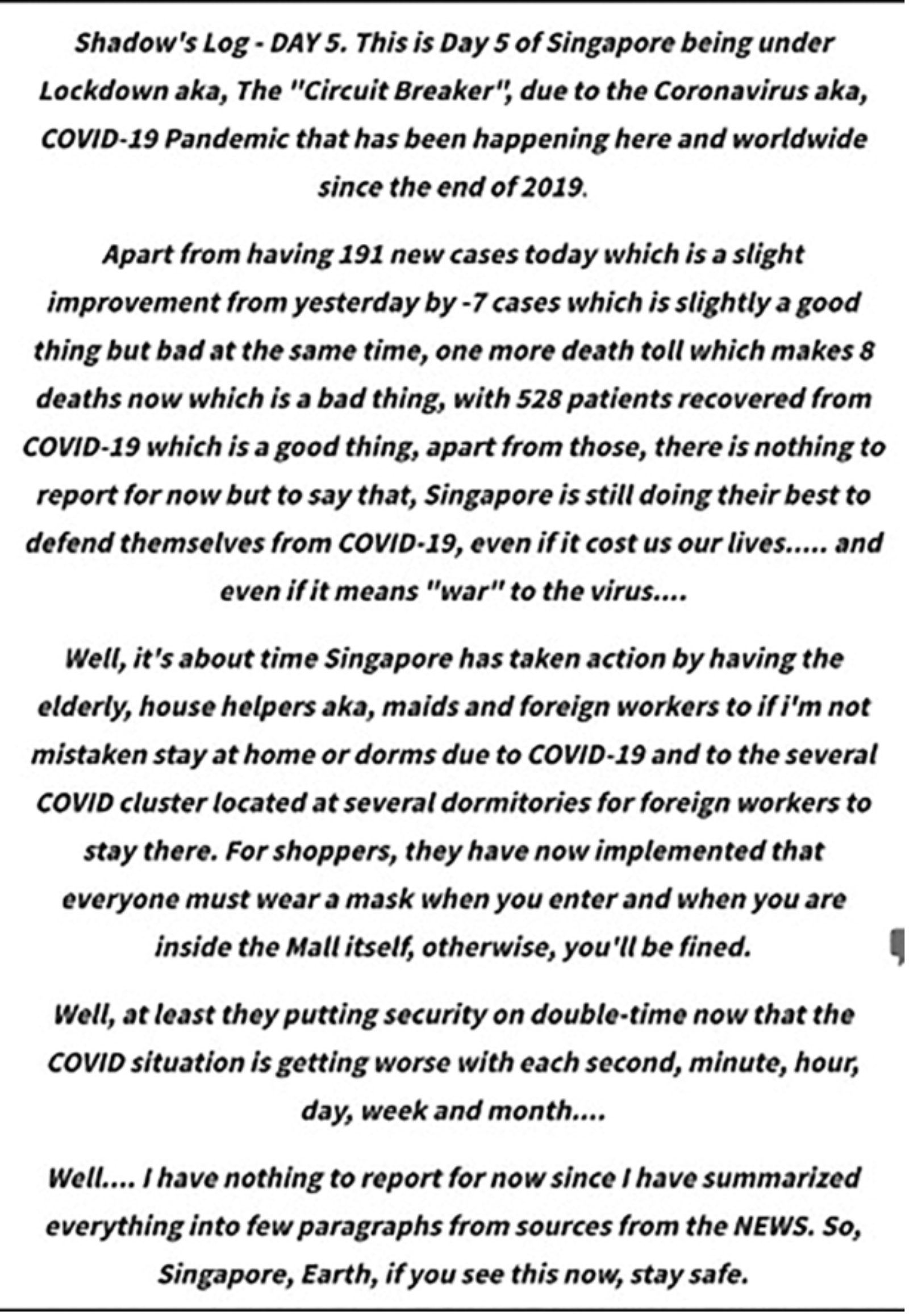Digital humanities scholars Hoyt Long, Richard Jean So, and Kaitlyn Todd examine amateur writing on the social writing platform Wattpad during the COVID-19 pandemic in their academic article “COVID, Crisis, and the Search for Story in the Platform Age.” Wattpad is an online platform where users can post written works under aliases and receive comments from readers. The authors used distant reading, consisting of quantitative analysis of works relevant to COVID-19, statistics of Wattpad users publishing works during COVID-19, and word frequency in COVID-19 related works, to construct a “#COVID corpus” with works above 1,000 words categorized under the umbrella hashtag of “#covid.” They formulated variables including “COVID-ness” to measure the extent to which a work engages with the pandemic explicitly, and “sociality” to measure the amount of character interaction within a work, to examine how Wattpad authors responded to lockdown through writing at different points during the pandemic, how readers received the representation of social interactions in Wattpad COVID-19 writing, and the differences between COVID-19 writing on Wattpad and elsewhere.
Wattpad writing diverged from traditionally published literature at the outset of the pandemic for its immediacy and ability to capture minute details of pandemic life as they arose. The responsiveness of Wattpad writing was thanks to the low barrier of entry and accessibility of Wattpad’s online platform, only requiring users to register for an account to be able to publish works and interact with others. As a platform that combines not only publishing but also social elements like reader commenting, Wattpad incentivizes writing through means different from traditional publishing, as it is “a medium at once more social, more interactive, and more directly attuned to reader response than traditional print publication, oriented less around posterity than immediate personal reward and affirmation” (Long, So, and Todd 536), using the possibility of attracting a vast online readership to encourage content creation.
The #COVID corpus was generally less social than most writing on Wattpad, and especially so in the early months of the pandemic (January 2020 – October 2020), where informative texts that reported news about the pandemic, or blog-type texts like health recommendations, business advice and conspiracy theories, and diary entries or life writing were more common. As lockdown continued in many countries, people turned increasingly towards fiction, such as the work of speculative fiction Adam’s Secret Journal by Chloé Philibert, which projects 2020 lockdown experiences onto a dystopian future with an infinite lockdown. Fanfiction, or works of fiction written using the characters or universe of existing media, also grew in popularity as an escape from reality. Fanfiction has “infinite generic permutations” (McGurl, qtd. in Long, So, and Todd 552), which serves therapeutic and entertainment purposes for readers and writers by distracting from the boredom and distress from people’s extended home stays. One such work, Life Can Be a Struggle by Descendantsfan03, is a fanfiction of the 2020 film Songbird which shares themes of dystopian futures and perpetual lockdown with a lot of original Wattpad fiction. However, the fanfiction takes a different approach, rewriting the film in the slice-of-life genre and recording ordinary moments between Sara, the protagonist, and her young toddler Mal. The evolution of forms and genres in Wattpad writing over the development of the pandemic reflected how Wattpad democratized writing, which was made possible by the lack of restrictions on writing posted to the site.
Social writing platforms like Wattpad have been home to works by amateur writers since the 2010s. The COVID-19 pandemic that forced the world into lockdown inspired countless people to write and share their work on Wattpad, and the ease of publishing and lack of restrictions on form, genre, or theme on Wattpad allowed writers to respond immediately to the circumstances of lockdown, while drawing on either their own observations or the plots, characters, or worlds from the media they enjoyed. This article not only describes literature that emerged and evolved alongside writers who were confined to their homes but also expands our knowledge of new forms of reading and writing that have become increasingly online and open to participation from all.

Image Captions:
Figure 7. Screenshot of a Wattpad story with a high degree of COVID-ness. Via “COVID, Crisis, and the Search for Story in the Platform Age” by Hoyt Long, Richard Jean So, and Kaitlyn Todd. Critical Inquiry, vol. 49, no. 4, 2023, pp. 530–56, https://doi.org/10.1086/725059.Citation: Long, Hoyt, Richard Jean So, and Kaitlyn Todd. “COVID, Crisis, and the Search for Story in the Platform Age.” Critical Inquiry, vol. 49, no. 4, 2023, pp. 530–56, https://doi.org/10.1086/725059. NON-FICTION, SCHOLARLY ARTICLE | US. ll
Source Type: Scholarship on COVID-19 Studies
Country: US
Date: 01-Jun-2023
Keywords: Amateur Writing, Digital Humanities, Fanfiction, Immediate Responses to COVID-19, and Wattpad